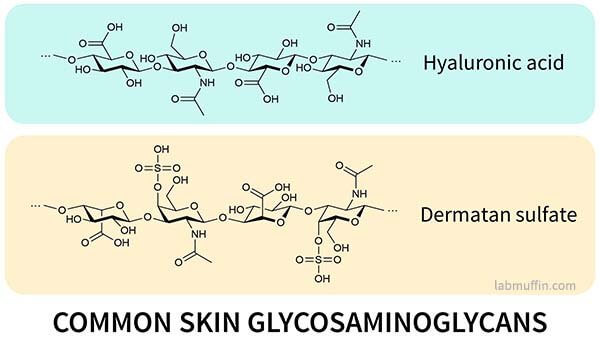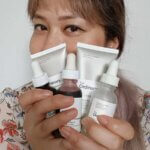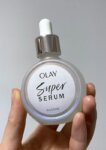Retinoids are vitamin A derivatives, and they’re some of the most popular ingredients in skincare. They’re anti-aging, anti-pigmentation and anti-acne, plus their effectiveness is backed by lots of studies. But like everything else in skincare, there are lots of myths and half-truths about how they work and how you’re meant to use them.
Here’s the video on YouTube – keep scrolling for the blog post!
What is a retinoid?
Retinoids are ingredients that work like vitamin A. They have lots of applications in skincare – their main uses are to help with acne and skin aging (specifically wrinkle reduction and evening out pigmentation). They’re one of the few things that can reverse the signs of aging.
Some examples of retinoids:
- Retinol
- Tretinoin
- Adapalene
- Tazarotene
- Retinyl esters
- Retinaldehyde
Related post: My Routine for Starting on Tretinoin (Retin-A) Cream (with video)
Myth 1: Retinoids thin your skin
This was one of the myths that stopped me from trying retinoids for a long time! Retinoids thin one specific layer of your skin, but they will actually thicken it overall.
Retinoids thicken the living dermis and epidermis
Retinoids thicken the living layers in the dermis and epidermis in a few different ways:
- They thicken the epidermis by causing cell proliferation (more cells are produced).
- They also increase the production of glycosaminoglycans (GAGS), which are long sugar based molecules that can hold on to lots of water (one example is hyaluronic acid). They’re like a humectant moisturiser within your skin. This extra water retention plumps up your skin.

- Retinoids also prevent collagen degradation and increase its production, so the dermis gets thicker.
The thickening of the lower layers is actually what helps give retinoids their anti-aging effect: if you have plumper skin, then it looks smoother and wrinkles are less deep.
Retinoids thin the stratum corneum
Retinoids can also compact the stratum corneum, the top layers of dead cells on the surface of your skin at the top of the epidermis, making it thinner. This is generally a good thing – when you have a thinner stratum corneum, your skin looks glowy and smoother.
But thinning the stratum corneum can also have negative effects. The stratum corneum is there to protect the living layers of your skin, and so if it gets too thin you skin can become sensitive.
Myth 2: Retinoids are light sensitive so you need to use them in the dark
This is partly true.
A lot of retinoid ingredients are unstable in light (photounstable), and so if you have too much light exposure they’ll break down and no longer work. This is especially the case with sunlight, since it’s one of the most intense sources of light we receive.
But there are some retinoids that aren’t light sensitive!
Some of the newer retinoids like adapalene and tazarotene aren’t sensitive to light (photostable), so you can actually use them during the day.
Tretinoin is generally light-sensitive, but it can be formulated so it isn’t – one example is micronised tretinoin.

Retinol is generally unstable and breaks down in light. so you should be applying it at night.
if you’re not sure whether your particular retinoid product is photostable, follow the instructions on the packet.
Myth 3: If you don’t see immediate results, it isn’t working
This is not true for skin care products in general, and it’s especially not true for retinoids.
Some people will see immediate results, but a lot of people won’t – but that doesn’t mean that the retinoid isn’t working!
Unlike a lot of other skincare products, retinoids can have effects deeper in the skin, and will change how cells develop. To get to these deeper levels and have effects that show up on the surface, it can take a bit longer.
A good rule of thumb is to use retinoids for 3 to 6 months before you dismiss them as something that isn’t working for you.
Myth 4: Retinoids can’t give immediate results
On the flip side, there’s a myth that retinoids can’t possibly give you immediate results, and that anything that you see earlier than 3 to 6 months is either just in your head or because of some other products that you’re using.
Retinoids have actually been documented to give some people results very quickly in peer reviewed studies. The fastest results are that your skin might look smoother, and you get a pink or rosy glow. But these early results don’t happen for everyone, and if you don’t have early results it doesn’t necessarily mean that you won’t have results later on.
More about this myth: How long do retinoids take to work?
Myth 5: Don’t use retinoids until you see signs of aging
There are a few reasons this myth isn’t true.
First, there’s no evidence that using retinoids early or using them long-term will cause any sort of skin damage.
The changes in your skin that lead to skin aging will also occur before you can actually see any signs of aging on your skin, so retinoids can stop and help reverse these microscopic changes before they start showing up.
Retinoids are also useful for things other than anti-aging, such as acne – they help with skin turnover, and reduce the tiny microscopic clogs (microcomedones) that eventually turn into pimples.
You also won’t run out of skin because your skin is turning over too fast.
So there’s no limit on how old you have to be before you can start using retinoids!
Myth 6: Bakuchiol is better than retinol
Bakuchiol is an ingredient found in the babchi plant. There’s been a lot of hype about how it’s a natural retinol, or that it’s better than retinol, or it’s just as good as retinol without any of the downsides. There’s even some talk about it being better than prescription tretinoin!
This is pretty far-fetched.
Although there’s been one recent independent clinical study that shows comparable results to retinol (albeit when you use it twice as often), and bakuchiol and retinol have some similarities in how they work, there’s nowhere near the same amount of evidence for bakuchiol compared to retinoids.

It’s a promising new ingredient, but it isn’t in the same ballpark as retinoids.
More on this myth: Bakuchiol: Better Than Retinol?
Myth 7: You need to use retinoids daily
This is not true. There’s been studies where tretinoin was used once a week, or three times a week, or every second day, and skin improvements were observed.
Most of these most of these studies were done on tretinoin, a particularly strong prescription-only retinoid, but there’s no reason why this doesn’t apply to other retinoids as well. (This is the case with most studies on retinoids – there’s lots of data on tretinoin but not much on other retinoids.)
Are there any other retinoid myths you’ve been wondering about?
How to start on retinoids: My Routine for Starting on Tretinoin (Retin-A) Cream (with video)
More about setting up a skincare routine: The Lab Muffin Guide to Basic Skincare
If your skin isn’t ready for retinoids yet: Free Essential Guide to Exfoliation






Hi, I love you and your videos. I will post here the same question as I did your YouTube video. Here in my country the only product that we have with tretinoin has fragrance ( retirides ). So I was wondering what is the evidence for tazarotene or Adapalene compared to tretinoin in regards for anti-aging.
Thanks!!
I’m using the same brand at 0.025%. The other one 0.05% has no added fragrance. If you are afraid of more iritation you can use first a cream like LRP B5 and then you apply the retirides. In case you are more sensitive you can use from Bioderma Matricium. I never ever found a product like this witch improve the redness, inflammation and wrinkles.
I’ve seen in many places that Retinol isn’t advisable during pregnancy. Why is this? Is it a precautionary approach of ‘it’s not tested on pregnant women’ or is there evidence of it being harmful in some way?
Vitamin A impacts cell proliferation and differentiation, so the theory is that it could alter the development of the fetus. For this to happen, topical vitamin A would need to be absorbed into the blood stream, and if a product has a high enough concentration to absorb into the blood stream it would be classified as a medical drug. That said, studies on pregnant women are either few or nonexistent, because expectant mothers aren’t willing to test this theory. So, the prevailing advice is to err on the side of caution and avoid vitamin A while pregnant or breastfeeding.
Your posts are terrific – I appreciate the science and lack of hype. I am older (63) and had used prescription tretinoin for about 10 years until it seemed to become too drying and irritating. I’d appreciate your thoughts on how to care for ‘older’ skin and whether to use retinol products.
what about pregnancy and Tretinoin or Retinols in general? A lot of people say not to use, why is that? And is this throughout the whole term?
Thanks for this! I recently started using tret so this post is very useful. Also, thanks for presenting info in both video and text form; I dislike watching videos so I really appreciate it.
Thank you once again for this myth busting blog post, Michelle. I use my Tretinoin three times a week and my skin never looked better. It helped with my acne and any attempt to increase it only increased dryness and Irritation, so three times a week it is!
Thanks for your post Michelle. Speaking of retinoid myths, would you be able to address the online reports of fat/volume loss on tretinoin in a future post? They got me a bit worried but I’m not a scientist so don’t know what to think. Is it possible? I’ve noticed some volume loss in my face in the last months and I keep wondering if it’s related… I would appreciate if you could share your opinion on this!
Can you explain how someone can safely shift their routine from retinoid to acids for exfoliating or vice versa. What I know is retinoids and exfolation acids should not be used together . So how should we shift from one to another without getting any issues. can people with extreme dry skin also use retinoids. Can we use retinoids for hands and foot also.( I have very skin skin and extreme wrinkles there). Do retinoids work on stretch marks . If not what can use for thinned skin due to stretch marks.
Is micronized tretinoin the same as tretinoin microsphere? Are they both photostable?
hi, thanks for all these informations and demo but i have a quaestion are retinoids good for keratosis pilaris?
Retino-a ruined my skin. A lot of wrinkles appeared.